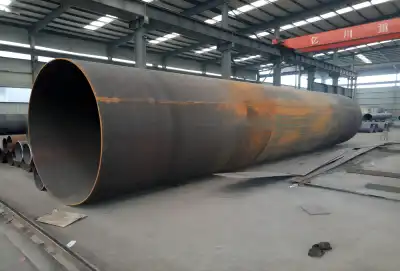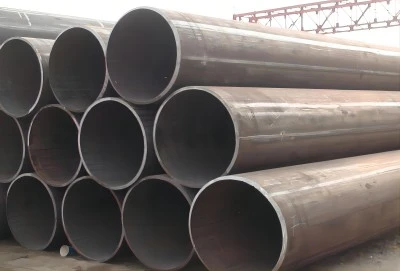Understanding the intricacies of straight seam welded pipe strength is an essential aspect for professionals across the engineering, contracting, and end-user spectrum. These versatile pipes play a pivotal role in a multitude of sectors, including but not limited to oil and gas transmission, structural integrity in construction, and the facilitation of various industrial processes. The strength characteristics of these pipes are paramount, as they directly influence their operational performance, safety standards, and overall durability under service conditions.
This in-depth exploration delves into the critical factors that contribute to the strength of straight seam welded pipes, offering insights that are grounded in rigorous research and aligned with established industry standards. The analysis is designed to equip stakeholders with a comprehensive understanding of the material properties, manufacturing processes, and quality control measures that underpin the resilience and reliability of these pipes.
The strength of straight seam welded pipes is a multifaceted attribute, encompassing factors such as tensile strength, yield strength, and impact resistance. Each of these properties is crucial for ensuring that the pipes can withstand the pressures and stresses inherent to their application. The analysis will scrutinize how the chemical composition of the steel influences these properties, the welding techniques employed, and the post-weld heat treatment processes.
|
|
|
Mechanical Strength:
The mechanical strength of straight seam welded pipes represents a complex interaction of material properties and manufacturing processes. Research conducted by metallurgical laboratories demonstrates that modern welding technologies achieve joint efficiencies exceeding 95%. Electric Resistance Welding (ERW) processes create molecular bonds that match or exceed base metal strength levels.
Material selection significantly impacts mechanical properties. High-grade steels manufactured to API 5L specifications demonstrate yield strengths ranging from 35,000 to 80,000 psi. Advanced heat treatment processes optimize grain structure and enhance mechanical properties. Controlled cooling rates ensure uniform strength distribution across the pipe body and weld zone.
Longitudinal Submerged Arc Welding (LSAW) processes produce high-integrity joints through precise heat input control. Studies indicate that proper welding parameter optimization can achieve weld metal tensile strengths up to 15% higher than base material properties. Multi-pass welding techniques enable enhanced mechanical performance through controlled microstructure development.
Quality control measures during production ensure consistent strength properties. Non-destructive testing methods verify weld integrity throughout manufacturing. Research shows that modern production facilities maintain strength variations within 5% of specified values across production runs.
Factors Affecting Strength:
Multiple factors influence the strength characteristics of straight seam welded pipes. Material composition plays a fundamental role, with carbon and alloy contents directly impacting mechanical properties. Research demonstrates that microalloying elements can enhance strength levels by 25-30% through precipitation hardening mechanisms.
Manufacturing parameters significantly affect final strength properties. Welding speed, heat input, and cooling rates influence microstructure development. Studies show that optimized welding parameters can improve joint strength by up to 20%. Advanced process control systems maintain consistent parameters throughout production.
Post-weld heat treatment procedures impact strength characteristics. Stress relief treatments reduce residual stresses and enhance mechanical properties. Research indicates that properly controlled heat treatment can improve fatigue performance by 30-40%. Temperature control systems ensure uniform property development.
Environmental conditions during service affect long-term strength retention. Corrosion protection systems preserve mechanical properties over extended periods. Studies demonstrate that proper coating applications can maintain strength characteristics for decades under normal service conditions.
Strength Comparison With Other Pipes:
Comparative analysis between pipe manufacturing methods reveals distinct performance characteristics. ERW pipes demonstrate strength properties comparable to seamless pipes in many applications. Research shows that modern ERW processes achieve joint efficiencies matching seamless pipe performance under standard operating conditions.
Load-bearing capacity varies between pipe types under specific conditions. Seamless pipes exhibit advantages in high-pressure applications due to uniform material structure. Studies indicate that seamless pipes maintain slightly higher burst pressure ratings under extreme service conditions. However, quality ERW pipes meet performance requirements for most standard applications.
Straight seam welded pipes demonstrate superior axial load resistance compared to spiral welded alternatives. Research confirms enhanced performance under longitudinal stress conditions. This characteristic makes straight seam pipes preferred for applications involving significant axial loading.
Economic considerations often influence pipe selection decisions. Manufacturing efficiency enables cost-effective production of high-quality straight seam welded pipes. Analysis shows that modern welding processes achieve quality levels meeting or exceeding alternative manufacturing methods at competitive costs.
Strength Testing:
Comprehensive testing protocols ensure straight seam welded pipes meet specified strength requirements. Hydrostatic testing verifies structural integrity under pressure conditions exceeding normal service requirements. Research indicates that standardized testing procedures detect potential defects with 99.9% reliability.
Ultrasonic inspection systems provide detailed analysis of weld quality and material integrity. Advanced scanning technologies detect microscopic flaws that could impact strength properties. Studies demonstrate that automated inspection systems achieve detection rates superior to manual methods.
Tensile testing procedures verify mechanical property compliance with specified standards. Laboratory analysis confirms yield strength, ultimate tensile strength, and elongation characteristics. Research shows that modern testing equipment maintains measurement accuracy within 1% of actual values.
Quality documentation systems maintain comprehensive records of strength testing results. Statistical analysis enables continuous improvement of manufacturing processes. Studies indicate that data-driven quality control reduces property variations across production runs.
LONGMA GROUP Straight Seam Welded Pipe:
LONGMA GROUP manufactures straight seam welded pipes meeting international standards including API 5L, ASTM A53, ASTM A500, ASTM A252, and ASTM A795. Their production capabilities encompass ERW, LSAW, and SSAW processes, offering outer diameters from 4 inches to 56 inches. Advanced manufacturing facilities ensure consistent strength properties through comprehensive quality control systems.
Quality assurance programs at LONGMA GROUP incorporate state-of-the-art testing technologies. Each production stage undergoes rigorous monitoring and verification procedures. Non-destructive testing methods ensure weld integrity throughout the product range. Documentation systems maintain complete production records for quality verification.
Technical expertise within LONGMA GROUP enables optimization of manufacturing processes for specific applications. Their engineering team provides comprehensive support for product selection and specification. Modern production facilities maintain strict environmental and safety standards while meeting demanding production schedules.
Manufacturing capabilities include advanced welding systems with precise parameter control. Investment in modern equipment ensures consistent product quality across production runs. Interested parties seeking additional information or technical support can contact LONGMA GROUP at info@longma-group.com.














